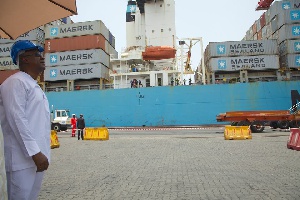Ghana’s President, John Dramani Mahama has observed that the country’s growing dependence on imported products has dampened the confidence and morale of Ghanaians to be self-reliant in food consumption.
He said the Ghana’s inability to be self-sufficient in food production has cut deep into the pride of the citizens, many of whom now spend a chunk of their earnings on foreign made goods.
According to President Mahama, the decision by governments in many developed countries to relentlessly subsidize farming inputs has put the country in dire situation to reverse the trend.
“Ironically, developed economies like the United States continue to subsidize their farmers, so currently US rice imports are the staple in Ghana. Actually, the majority of the staples in Ghana are imported.
“We import frozen fish, frozen poultry, groundnut oil, soya bean oil, and so many other products that we are very capable of producing, and it is costing us dearly. In 2013 alone, it cost us $467.2 million to import rice; $217.2 million to import sugar; and $234.4 million to import vegetable oil.
“But the cost is not just financial. It is also costing us in the heightened morale, pride, confidence and sense of national unity that comes from being self-sufficient. And those things are equally as vital to nation-building and development,” he said.
President Mahama, who sounded nostalgic in Colonel Kutu Acheampong’s “Operation Feed Yourself” programme, made these remarks on Friday when he delivered a speech on Economic Governance in Unchartered Waters at the John F. Kennedy Forum Institute of Politics, Kennedy School of Government- Harvard University in the USA.
The President said the policy directions of the ex-military head-of-state in the 70s revamped the agriculture sector and made the country self-sufficient in food production even though other policies of Colonel Acheampong put the country in a tight position.
“When people speak of the early period of Acheampong’s reign and the progress that was made under his programmes, particularly “Operation Feed Yourself,” they do so with nostalgia, and the yearning seems to be defined more by a lost sense of identity than by anything else because those were not particularly the best of times—and the economic policy of “Yentua” or “We won’t pay” is not only impractical but irresponsible.
“Yet, are economic planning and policies that do not include or encourage self-reliance any more practical or responsible?” he queried.
Currently, the Mahama administration is pursuing the consumption of made-in-Ghana agenda in a bid to cut the country’s import bills with non-oil imports declining by 22 percent to US$7.2 billion at the end of the second week of September this year.
Click to view details



Business News of Sunday, 28 September 2014
Source: BFT

















